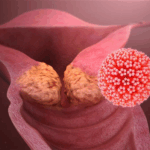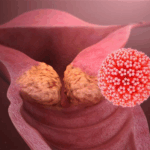
As part of Joy FM’s Cancer Awareness Month campaign, Obstetrician-Gynecologist Professor Samuel Antwi Oppong has urged women to take any form of abnormal vaginal bleeding seriously, warning that it is often the first and most common early sign of cervical cancer.
Speaking on the Super Morning Show on Wednesday, October 22, Prof Oppong explained that cervical cancer, which affects the cervix, the lower part of the womb, remains one of the leading causes of cancer-related deaths among women in Ghana.
He said the disease often develops quietly, with little or no symptoms in its early stages, making subtle changes like unexpected bleeding a crucial warning sign.
“Most cervical cancers at the very early stages will not show any symptoms or signs at all. However, when it comes to symptoms related to cervical cancer, the commonest tend to be abnormal vaginal bleeding.”
Prof Oppong described abnormal bleeding as any bleeding that occurs outside a woman’s normal menstrual cycle, particularly after sexual intercourse or after menopause.
“Bleeding after sexual intercourse tends to be the first sign. Because of the location of the cervix, during intercourse, the penis can make contact with it, and if there’s an ulceration caused by cancer, it can easily provoke bleeding.”
He added that in more advanced cases, bleeding may occur spontaneously, even without any contact. “A woman may have finished her period and expect to be dry, but she may notice some bleeding again. Sometimes, a woman who has already reached menopause and is not supposed to bleed begins to see blood. That is never normal,” he warned.
“Every woman who reaches menopause and after that begins to see any amount of bleeding, it doesn’t matter how small, must get checked as quickly as possible.”
He explained that while not all post-menopausal bleeding is caused by cervical cancer, it always requires medical investigation. “It may not be cancer, but it’s a sign that something is wrong, and it needs to be checked,” he said.
Prof Oppong revealed that about 80% of cervical cancer cases are caused by the Human Papillomavirus (HPV) a sexually transmitted infection.
“Unlike several other cancers where we may not know the cause, for cervical cancer we know that at least 80% are caused by infection and persistent infection by this organism we call the human papilloma virus,” he said.
He clarified that the virus spreads only through sexual contact, not through blood or casual physical touch. “It is transmitted only through sexual contact with the genital areas and the mouth,” he said.
Although HPV can infect men as well, he explained that men do not develop cervical cancer. “Men don’t have a cervix, so they will not suffer from cervical cancer. But this same virus can cause throat and penile cancer in men,” he added.
According to Prof Oppong, women who start sexual activity at a young age, have multiple sexual partners, or have a weakened immune system are at higher risk.
He noted that people living with HIV, those receiving cancer treatments, or using long-term steroids are more vulnerable to persistent HPV infections.
“Smoking also increases the virus’s ability to cause cancer within the cervix,” he added, explaining that chemicals in tobacco can promote the infection’s persistence.
Prof Oppong said that early screening is the most effective way to prevent cervical cancer. “Between the time a woman acquires HPV infection and when she develops the first sign of cervical cancer could take 10 to 15 years,” he said. “That gives us enough time to detect and treat it before it becomes dangerous.”
He explained that simple and affordable screening tests exist, including Visual Inspection with Acetic Acid (VIA), which uses vinegar to detect changes on the cervix, and the Pap smear, which checks for abnormal cells.
“These minor abnormalities, which are still precancerous, can be treated easily and cured so that they don’t progress to cancer,” he said.
Prof Oppong encouraged women to overcome fear or embarrassment and make cervical screening part of their routine health checks.
“It may feel a bit uncomfortable, but compare that to the risk of developing cervical cancer and going through very expensive and troubling treatments, it is worth the effort,” he urged.
- President Commissions 36.5 Million Dollars Hospital In The Tain District
- You Will Not Go Free For Killing An Hard Working MP – Akufo-Addo To MP’s Killer
- I Will Lead You To Victory – Ato Forson Assures NDC Supporters
Visit Our Social Media for More




